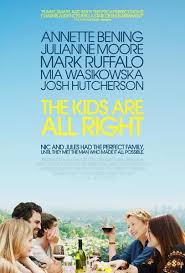Pissin' me off.

AMPAS decided yesterday, in its annual meeting to discuss changes to the Oscars, that instead of a solid 10 Best Picture nominees every year, there can be anywhere between five and 10 nominees, depending on how many films receive 5% of the first-place votes. This means there could be five nominees, or seven, or eight, etc., etc. Of course, commenters are delighted, since "terrible" films such as Winter's Bone and The Kids Are All Right will probably be excised. But that's one thing that really agitates me: I semi-praised, semi-feared the expansion to 10 films two years ago because I hoped it would highlight much smaller films like Winter's Bone and The Kids Are All Right, films that were critically praised but too small to earn Oscar attention. For me, I believed this would even the playing field, allowing megahits like Inception and True Grit to exist side-by-side with these smaller films. And though that didn't necessarily happen in 2009 (Yay District 9, An Education; boo The Blind Side), 2010 represented a perfect balance of high-quality films big and small.



Well, that will probably be no more. Smaller films will likely be hurt by this new system without overwhelming and passionate support, and animated films will probably take a hit as well (despite the love for Pixar, how many first-place votes do you think Up and Toy Story 3 actually received?). And with the potential for a different number of nominees every year, the outcries of "how could you snub such-and-such film?" will be louder than ever, since potential slots will exist.
The biggest problem, of course, will be that predicting the nominees will be even more of a bitch.
This wasn't the only rule change, however. I applaud the change in the Animated Feature category, which allows for four nominees if 13 to 15 eligible films are released during the year (previously, under 16 eligible films meant only three nominees, while 16 or more resulted in five). This at least opens up the field more, allowing for more competition. And in the Documentary categories, the eligibility period has been changed to the calendar year, rather than the September 1-August 31 period it has been previously (to accommodate, this year's eligibility period will extend from September 1, 2010 to December 31, 2011, with the new rule taking full effect in 2012). The "bakeoff" finalist list for Visual Effects will expand from seven finalists to ten in order to accommodate the category's expansion to five nominees, a decision that I'm honestly neutral about, but I suppose is good news. Sadly, stuntmen were once again snubbed, as the Academy refused to create a category honoring their work.
Of course, I could just be worrying about nothing. I tend to fret about rule changes every year. Not that I have any say in what happens, obviously, but I'll give the new system a chance and hope it turns out for the better.
What do you guys think about this? Good news, or bad?
AMPAS decided yesterday, in its annual meeting to discuss changes to the Oscars, that instead of a solid 10 Best Picture nominees every year, there can be anywhere between five and 10 nominees, depending on how many films receive 5% of the first-place votes. This means there could be five nominees, or seven, or eight, etc., etc. Of course, commenters are delighted, since "terrible" films such as Winter's Bone and The Kids Are All Right will probably be excised. But that's one thing that really agitates me: I semi-praised, semi-feared the expansion to 10 films two years ago because I hoped it would highlight much smaller films like Winter's Bone and The Kids Are All Right, films that were critically praised but too small to earn Oscar attention. For me, I believed this would even the playing field, allowing megahits like Inception and True Grit to exist side-by-side with these smaller films. And though that didn't necessarily happen in 2009 (Yay District 9, An Education; boo The Blind Side), 2010 represented a perfect balance of high-quality films big and small.
Do films like these stand a chance anymore?
Well, that will probably be no more. Smaller films will likely be hurt by this new system without overwhelming and passionate support, and animated films will probably take a hit as well (despite the love for Pixar, how many first-place votes do you think Up and Toy Story 3 actually received?). And with the potential for a different number of nominees every year, the outcries of "how could you snub such-and-such film?" will be louder than ever, since potential slots will exist.
The biggest problem, of course, will be that predicting the nominees will be even more of a bitch.
This wasn't the only rule change, however. I applaud the change in the Animated Feature category, which allows for four nominees if 13 to 15 eligible films are released during the year (previously, under 16 eligible films meant only three nominees, while 16 or more resulted in five). This at least opens up the field more, allowing for more competition. And in the Documentary categories, the eligibility period has been changed to the calendar year, rather than the September 1-August 31 period it has been previously (to accommodate, this year's eligibility period will extend from September 1, 2010 to December 31, 2011, with the new rule taking full effect in 2012). The "bakeoff" finalist list for Visual Effects will expand from seven finalists to ten in order to accommodate the category's expansion to five nominees, a decision that I'm honestly neutral about, but I suppose is good news. Sadly, stuntmen were once again snubbed, as the Academy refused to create a category honoring their work.
Of course, I could just be worrying about nothing. I tend to fret about rule changes every year. Not that I have any say in what happens, obviously, but I'll give the new system a chance and hope it turns out for the better.
What do you guys think about this? Good news, or bad?
Comments
I really need that symmetry in my life. And now its gone.
And of course, a large part of this has to do with getting people to watch the ceremony, not really about the fairness of honoring worthy films. Because viewership is all that matters anymore.
2008 - 5
2009 - 10
2010 - 10
2011 - 7
2012 - 6
2013 - 9
2014 - 9
2015 - 8
2016 - 5
Yuck! How do you even compare years? How can we even predict nominees for this year?